Wainwright Pilgrimage
Article by Chris Butterfield
Alfred Wainwright passed away on 20 January 1991. In the sprint of that year, Betty Wainwright honoured the request he had made in his 1966 autobiographical work Fellwanderer – The Story Behind the Guidebooks by scattering his ashes on the shore of Innominate Tarn on Haystacks. She was accompanied by Percy Duff, who had succeeded Wainwright as borough treasurer in 1967, and his two sons, Mike and Paul. Wainwright watched over the four of them as they were blessed with a bright, sunny day. They followed “Haystacks 7”, which features in The Western Fells and begins at the Honister Slate Mine car park. Paul assisted Betty by carrying the heavy brown container in his rucksack, which held Wainwright’s ashes.
<<>>
Mike and Paul Duff have commemorated the event by walking the same route every ten years. The latest walk would be their third on the 30th anniversary of Wainwright’s ashes being scattered. My wife Priscilla and I were honoured to accompany them in remembering Wainwright, Betty, and their father, Percy.
We met at the slate mine’s car park at about 6 am. We were the only people there, so there was a good chance that we might have the fell to ourselves for the duration of the walk. We planned to set off for Haystacks at the same time as the party had done thirty years earlier. There was a slight chill in the air, but luckily, no rain was forecast, and the morning’s mist was slowly dispersing, which was a promising start.
We followed the old tramway path to Dubs Quarry. Mike recalls Betty and Percy managing the initial steep section with ease. His dad was almost seventy years old and wasn’t a seasoned walker like Betty, but he was fit.
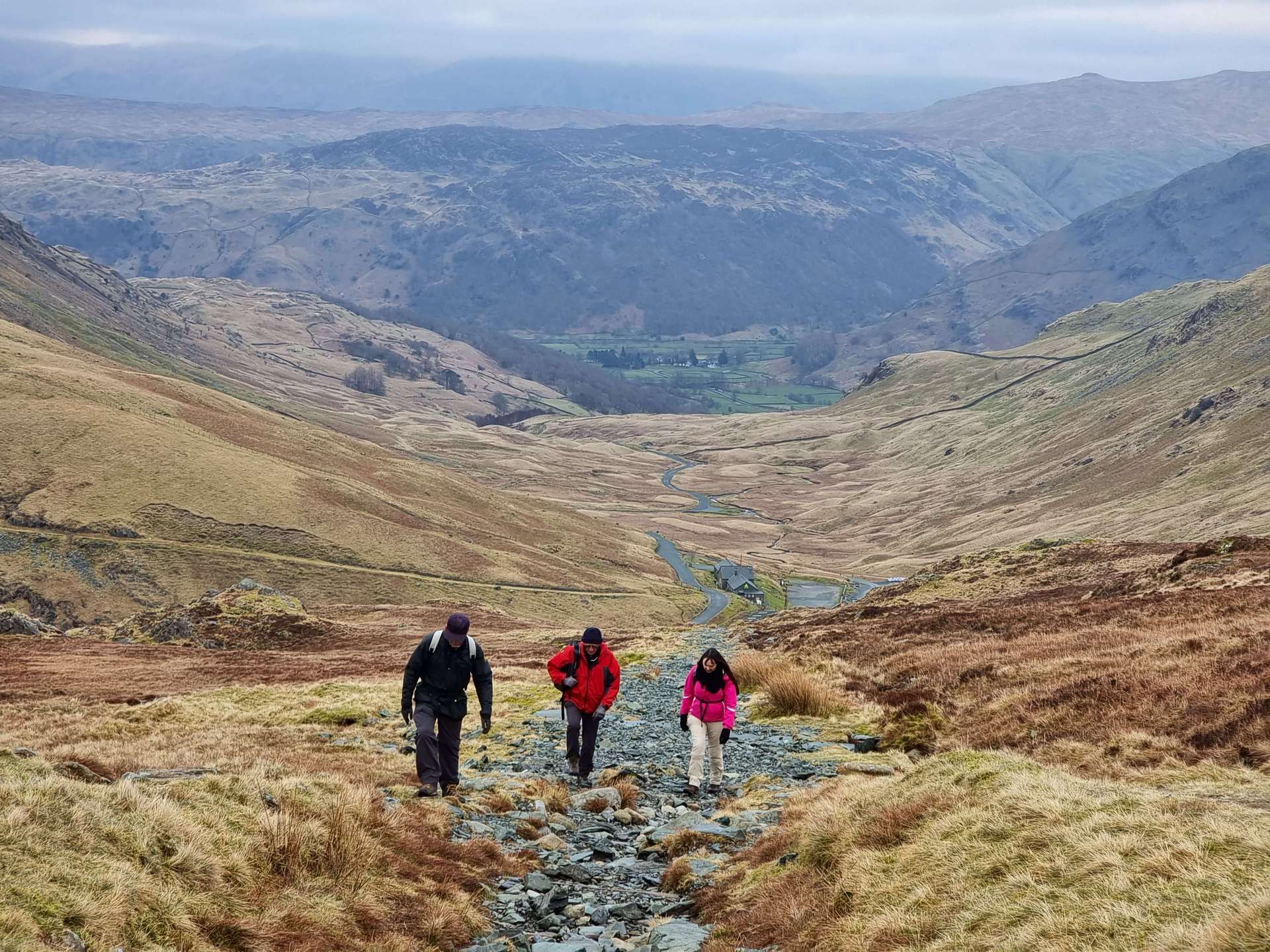
As we approached Dubs Quarry, we paused to take the route ahead. Haystacks and High Crag came into full view, with the summit of Pillar just visible under the cloud base. Nobody had stopped to rest in the quarry hut three decades earlier, so we followed suit and descended to Warnscale Beck.
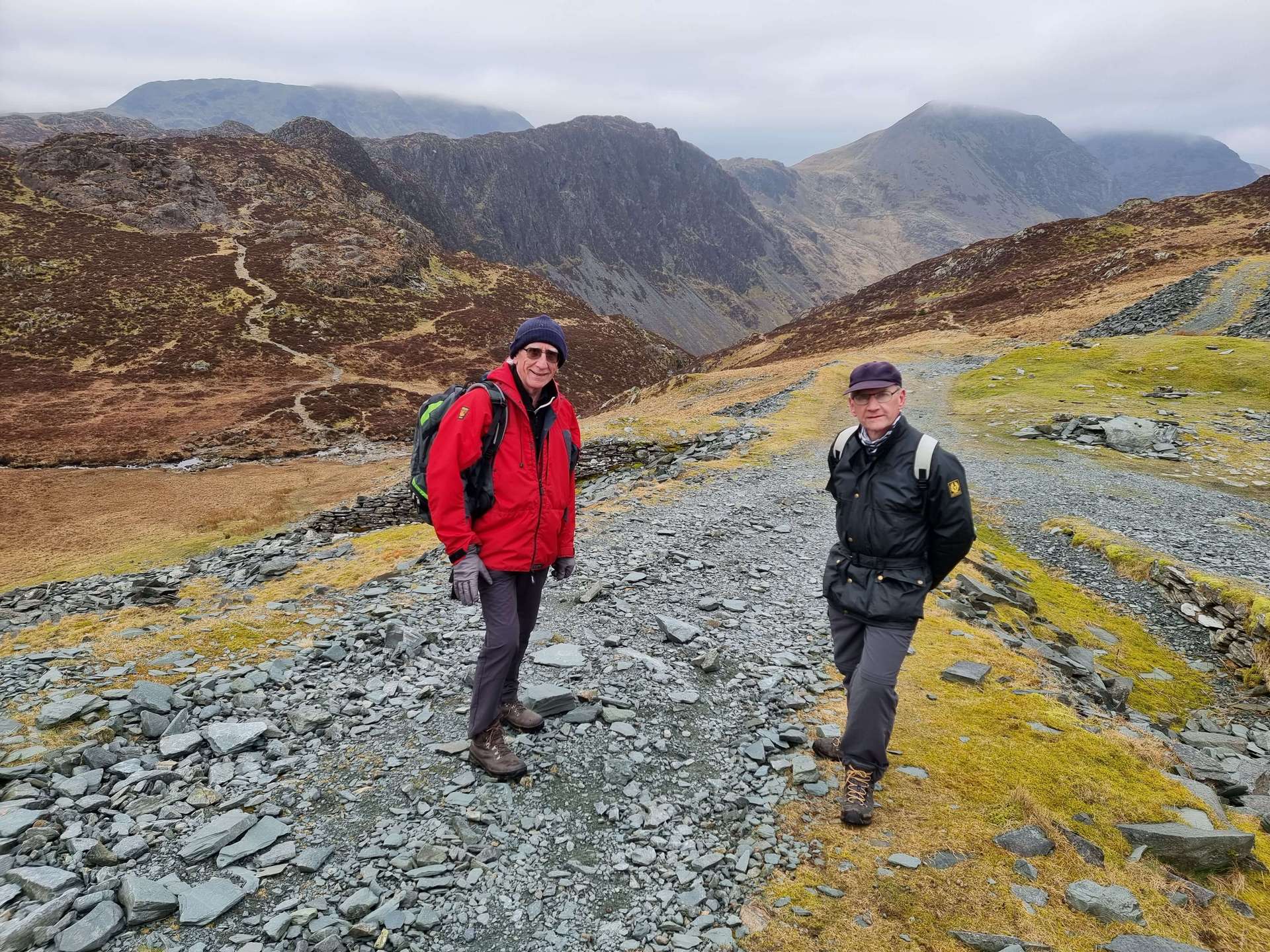
We continued past Little Round How and Great Round How. It was here, out in the open, that I stopped to scan the horizon. I spotted two people in the distance beyond Great Round How heading towards Honister. They were clearly on the Coast to Coast Walk path and possibly came up through Ennerdale. We wouldn’t see anyone else for the rest of the day. We paused at the gap between Haystacks and Green Crag to take in the magnificent view of Buttermere and beyond. On clear days, Buttermere is like a mirror.


The final approach to Innominate Tarn is via the steep stone steps. As you near the top, the rugged plateau with its reclusive tarn immediately opens up before you, and you are beneath the water level for a moment. Spectacular.
In his 1987 coffee table book Wainwright’s Coast to Coast (Michael Joseph), Wainwright described the tarn as Haystacks “finest jewel…a small shallow sheet of water in which flourishes the lovely bogbean and over which Great Gable and Pillar stand guard in ceaseless watch. A lonely spot of haunting charm…life seems good here. It is a venue for happy pilgrimages.”
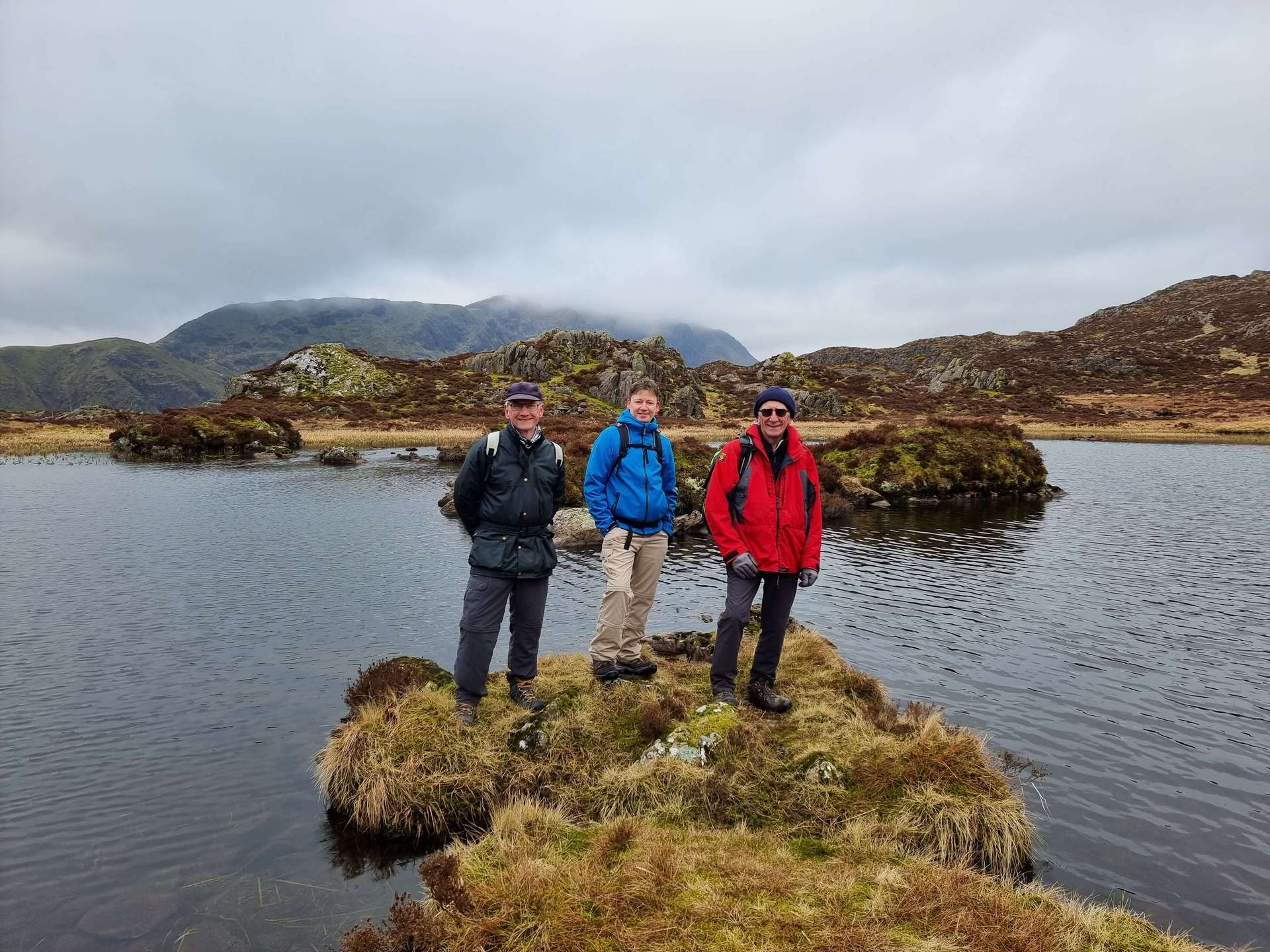
It was quiet, without a breath of wind, and barely a ripple troubled the tarn’s millpond-still surface. We each went to where Wainwright’s ashes had been scattered and paid our respects in silence. Thirty years earlier, to the day, Betty had found the perfect place: she had stood transfixed by the landscape and, holding the ashes close to her, spent some time alone in her thoughts before letting her husband go. Wainwright would forever become part of the landscape he loved.

We sat down for lunch at the same spot they did all those years ago, on a massive slab of rock overlooking the tarn. The cloud base was lifting slowly, and Pillar was in near-full view. Apart from a single Herdwick watching us cautiously from across the tarn and a couple of ducks introducing themselves in exchange for a bit of food, we were alone.
Mike had brought his photo album, which contained every photograph taken on the original trip decades earlier. We viewed the photos from the exact same locations, and nothing had changed, emphasising this landscape’s timelessness.
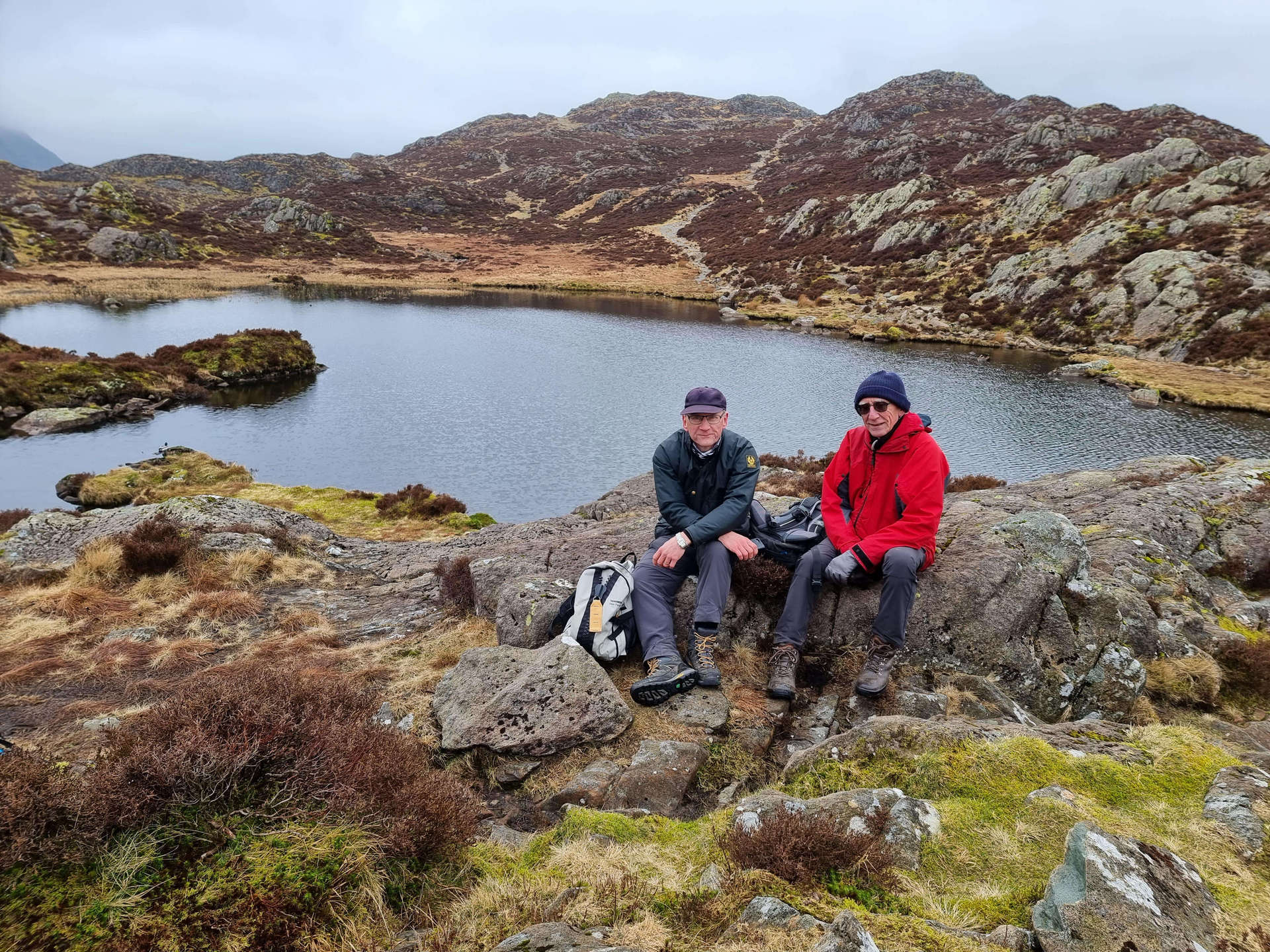
Our final destination was the summit and its two cairns. Despite its modest 1,959ft, Wainwright described this as the best fell top of all: “…for beauty, variety and interesting detail, for sheer fascination and unique individuality, the summit-area of Haystacks is supreme…a place of great charm and fairyland attractiveness,” he wrote in The Western Fells.
As we stood by the northern cairn, Mike spoke a few words about Wainwright, Betty and Percy. On our descent from the summit, the sun started to break through the clouds. We took advantage of the improved weather and spent a few more minutes by Innominate Tarn to reflect on the past before heading down.

As we passed Dubs Quarry for a second time, Mike and Paul reminisced about their previous visit ten years earlier. They had set off from the mine in torrential rain and appalling visibility. Conditions had not improved all morning, and they were severely weather-beaten by the time they reached the tarn. They wisely turned back, deciding it was too dangerous to make for the summit.

They were pleased with how things turned out this time—twenty years had been a long wait for better weather. We all wondered whether it would be our final trip together. Much could happen over the next decade. Wainwright himself was conscious of the passage of time and his advancing age. Every day we spend on the fells is a day less. Life is about enjoying the moment, and it was a privilege to share this walk with Mike and Paul.
The clouds cleared as we rested, revealing deep blue skies. The sun was like a glowing medallion, its emanating rays illuminating the dark shadows on the outcrops of Haystacks and its many crags. We surveyed the landscape behind us and bid farewell to Wainwright before following the old tramway path back to the car park. The day was a complete success. We had the whole fell to ourselves while completing the task. When Priscilla and I thought the surprises were over, Mike and Paul kindly gave us an A4 printout of the route from The Western Fells guidebook. We all signed it as a memento of the day.
Priscilla and I thank Mike and Paul for allowing us to accompany them on this personal journey. We all hope to do this walk again in another ten years, but if this proves to have been the last time, we will always be grateful for having been part of such a special day.
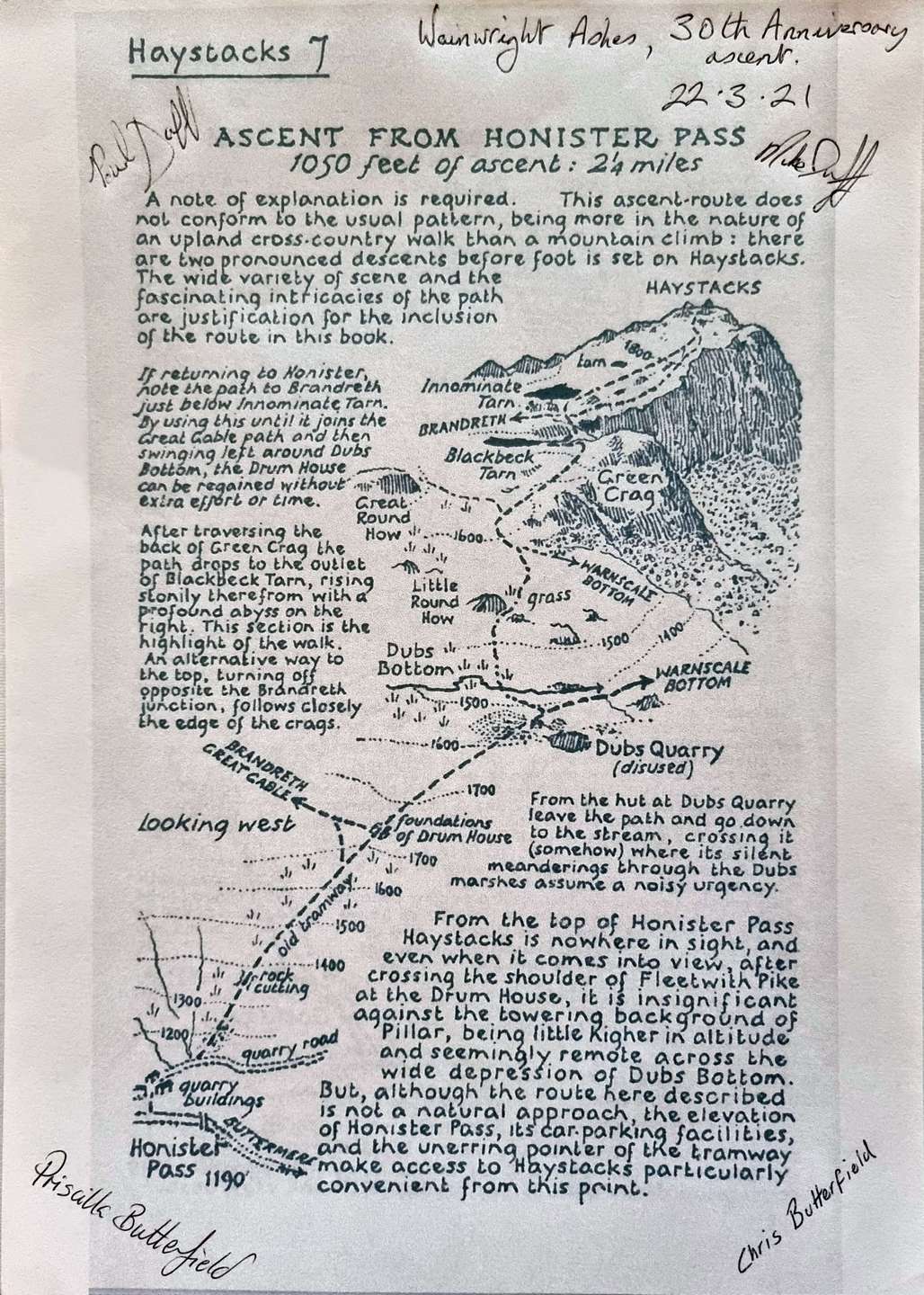
<<>>
This feature was originally published in Lakeland Walker in May/June 2021. I want to thank John Manning for encouraging me to record this important day.
An alternative walk report also appeared in the May 2021 edition of Lakeland Walker’s sister title, Cumbria magazine.
The 1991 photos are courtesy of the Duff family.
Back to top of page

